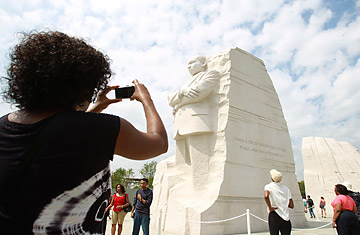
Visitors gather around the Martin Luther King, Jr. National Memorial in Washington August 26, 2011. The MLK dedication ceremony, originally scheduled for August 28, has been postponed due to Hurricane Irene
Washington is accustomed to turmoil (debt ceiling, health care reform, the occasional Supreme Court nomination) but rarely has a week here seemed so apocalyptic. First came Tuesday's 5.8-magnitude earthquake, the first in more than a century, which cracked the Washington Monument's top and sent the tip of one of the National Cathedral's spires to the ground. Then, there were the aftershocks. Now comes Hurricane Irene.
The authorities expected Irene to arrive between North Carolina and the tidewater region of southern Virginia Friday night, with winds up to 110 miles-per-hour, before barreling up the Eastern Seaboard, toward Washington and New York, one of the continent's most populous corridors. President Obama on Friday predicted the storm will be "extremely dangerous and costly," and abruptly ended his family's vacation on Martha's Vineyard to return to the White House. In New York City, Mayor Michael Bloomberg ordered the evacuation of some 270,000 residents of low-lying neighborhoods, and ordered the city's public transportation system closed Saturday. New Jersey Gov. Chris Christie urged residents along the Atlantic Coast to flee. Back in Washington, where Mayor Vincent Gray had yet to decide whether to declare a state of emergency Friday afternoon, the officials postponed Sunday's scheduled dedication of the memorial to Martin Luther King Jr.
The authorities predicted floods exceeding four feet in low-lying tidal areas, particularly in Virginia, and they expect the evacuation routes to many coastal areas of North Carolina to be cut off. Janet Napolitano, the homeland security secretary, said Friday that officials had issue this ominous warning: "The window of preparation is quickly closing."
This is the height of hurricane season, when correspondents typically expect to be dispatched to the Gulf Coast. It is especially rare for big hurricanes to strike the Mid-Atlantic region, or New England: Only three of the last century's costliest hurricanes have been in the area, most recently Hurricane Floyd, in 1999. No hurricane has struck Washington since Isabel, in 2003, and the last to pass directly over modern-day New York City came through in September 1821. Despite Washington's apparent sophistication — the glitzy embassies, the commanding towers of bureaucracy — this is, fundamentally, a traditional Southern city. It shuts down at the mere hint of snow. So it's hardly surprising that by Thursday afternoon, before the authorities declared a tropical storm warning for the region, Washingtonians had already started emptying supermarkets of bottled water and non-perishable food. For a while, it seemed that many here had visions of the 2007 movie Evan Almighty, in which a massive ark filled with zebras and wolves slams into the U.S. Capitol.
This weekend was to be celebratory, attracting thousands of people from across the country for concerts and a King memorial dedication speech by President Obama on Sunday, the 48th anniversary of the March on Washington. Late Thursday, the King memorial's organizers announced they would postpone the dedication until September, or October.
Still, on Friday, they opened the memorial to visitors, as planned. But even with a bit of sunlight and humid temperatures early Friday afternoon, the crowds at the memorial were surprisingly sparse. There were a few families snapping photos of the massive "Stone of Hope." There were a few television cameras. Gizaete Daget, a cab driver, tried to strike an upbeat tone, saying of Irene: "It's just going to lose strength."
He may have geography and physics to back him up, a bit. Washington is relatively far inland, and sits along the Potomac River, not the Atlantic Ocean where the risk of a storm surge is much higher. But the authorities say the risk of severe flooding within capital city is minimal. The greater threat is of wind uprooting trees from soil saturated by weeks of heavy rain.
Nevertheless, even in the marbled capital of the mighty United States of America, nothing quite puts fear in man as much as an act of God — especially if you think you can see it coming.
